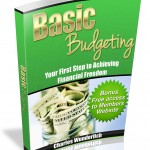How to Budget Your Money: Part 4
If you haven’t read How to Budget Your Money: Part 3, go back and read it before continuing.
Putting it All Together
So far we have covered the format of a budget, listing your income, and listing your expenses. Now it’s time to put it all together. As I said earlier, expect to change your budget often when you first start putting everything on paper.
There are two main reasons for having a budget. Knowing your income and expenses, and controlling where your money goes. Your income needs be more than your expenses, so if you’re making less than you spend, it’s time to make some drastic changes so you can get your finances turned around.
You should also work with what is known as a balanced budget. A balanced budget is when every dollar you earn is accounted for and has a purpose. When you down to the end of your budget you should not have any money left over.
Final Words
At the beginning you want to start out simple, once you get comfortable telling your money what to do, you can start adding more detail and micro manage if you wish, but I personally like to keep things simple. I prefer not to spend my entire weekend making changes to the numbers because I’ve got carried away and tried to micro manage everything. As a matter of fact, once you’ve worked with your budget for a while, it gets a lot easier and takes less time each month to create and update.
- Create a new budget sheet for each month of the year. The expected income and expense numbers should be about the same each month so it should be fairly easy to create a new budget each month.
- Review your previous month’s actual income and expenses when creating your new monthly budget.
- Use your budget to keep your spending under control. You should never spend more than you have set for your budget. The envelope system is a great tool to help control spending.
- If you’re having trouble with your expenses being more than your income, take a look at several of your highest expenses. There are usually ways to cut down on expenses.
- Use the debt snowball method to eliminate your credit cards and loans.
The hardest part is not creating the budget, it’s actually living by the plan that you created. While it’s much easier to put things on paper, it’s difficult to actually stick to your plan. So what’s your motivation to stick to the plan? For me, it was watching my credit cards and loans being eliminated, and knowing that I would have that extra money to start putting back money for retirement and start building wealth. Maybe for you it’s being able to pay cash for a new car, which by the way is a great feeling, or maybe being able to put money back to leave behind for your children.
These are all achievable goals and it doesn’t require a six figure income to make them a reality. As a matter a fact if you start out early enough and have the right investment strategy, there shouldn’t be any reason you can’t have an early retirement as a millionaire. Work hard now, so you don’t need to later!
 For more information on how to budget your money and other personal financial help, visit my Kindle Author Page.
For more information on how to budget your money and other personal financial help, visit my Kindle Author Page.
